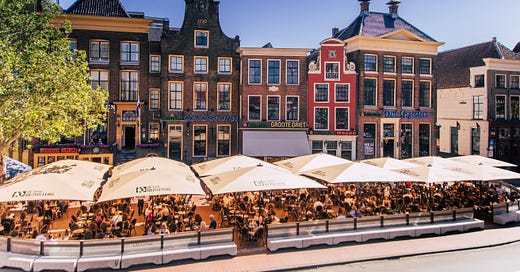Could Groningen Be Europe's Cultural Capital in 2033?
City council backs motion to explore a 2033 bid, highlighting Groningen’s creative energy, cultural strengths, and regional potential.
Groningen is setting its sights on becoming European Capital of Culture in 2033, with a majority of city council parties backing a motion to explore the bid. The proposal—spearheaded by D66 and supported by VVD, GroenLinks, Party for the Animals, Student & Stad, and the Party for the North—will be debated this week.
If approved, the city will launch an in-depth investigation into the benefits and feasibility of the candidacy, with findings expected by early 2026. Supporters say the title could bring economic, cultural, and social rewards to the city and wider region.
A Northern Dream, 25 Years After Leeuwarden
The move comes 25 years after nearby Leeuwarden held the same prestigious title in 2018. That year saw over 5.3 million visitors, 220 large-scale events, and 800 local initiatives, including the famous Royal de Luxe Giants and the “walking forest.” Groningen hopes to follow that example, but with its own innovative spin.
“This is more than a dream—it’s a call to action,” said D66 council member Maria Martinez Doubiani, who introduced the motion. “Groningen has everything: a thriving cultural sector, a young and diverse population, creative entrepreneurs, and international visibility. We’re ready to step onto the European stage.”
What’s at Stake
The designation of European Capital of Culture, introduced in 1985, is awarded each year to two cities in the EU. The aim: to celebrate the cultural richness and diversity of Europe, while boosting tourism, investment, and civic pride. Cities are selected four years in advance, but the process starts much earlier, with candidate cities submitting detailed proposals and securing funding for ambitious cultural programs.
If Groningen moves forward, it will be up against other Dutch cities such as The Hague, Nijmegen, Heerlen, and Middelburg, which have all expressed interest in hosting the title.
A Title with Impact
Proponents believe the title could generate a major boost for Groningen’s economy, tourism, and creative sectors. The bid is also seen as a way to bring the city and province closer together, fostering collaboration across communities and institutions.
“The title would be a calling card for the entire region,” said Doubiani. “It’s about innovation, inclusion, and showing what Groningen stands for.”
Supporters argue the process alone could be valuable, regardless of the outcome. The proposed study will assess what it takes to apply, what the cultural and economic benefits could be, what risks may arise, and how similar cities have managed past bids.
If the motion passes, the municipal executive will begin working closely with local cultural organisations, entrepreneurs, and the province to shape the bid. The European Commission, European Parliament, and Council of the European Union will officially select the Capital of Culture nominees in 2029.
Until then, Groningen has time to dream big and prepare carefully. As Martinez Doubiani put it, “If you believe in it together, it can become reality.”





